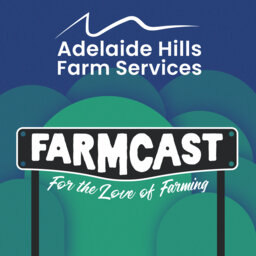Adelaide Hills Farmcast: June Edition
The Adelaide Hills Farmcast
A monthly farming podcast featuring Patrick O’Driscoll (Pods) and Belle Baker sharing a short list of timely jobs that lifestyle farmers could conside…In the Adelaide Hills Farmcast June Edition, Belle Baker looks at farming jobs Adelaide Hills lifestyle farmers should be planning for in the coming months. We'll cover topics such as calf marking and lamb marking, and what other animal husbandry tasks can be done whilst you've got them in the yards.
This episode was recorded near Woodside at the property of Jo and Sandy Gunter. Sandy talks to me about their recovery from the Cudlee Creek Bushfire and why she chose Polvin Fencing to replace the fencing around her day yards and horse arena.
And Pods and David Evans from Farmers Business Network talk about post-emergent spraying.
We hope you find this show helpful and welcome your comments below or email Belle or Pods at hello@ahfarmservices.com.au
Also, remember that each episode has chapter markers, so when you're playing, you can skip to the next section easily.
00:30 Adelaide Hills Farmcast June Edition
Introduction
01:35 Adelaide Hills Farm Almanac / Farm Calendar
Livestock
- Early June is a good time for calf or lamb marking. Of course this depends on when your calves or lambs were born. If you’re relatively inexperienced and only have to mark a handful of stock every year then the smaller the animal, the easier it’s going to be for you. Any time when the animal is over (approximately) 3 weeks is good. Any earlier and there is a risk of mis-mothering. I found a really informative and easy to read article on castrating beef cattle by the Kondinin Group, linked here: https://www.farmingahead.com.au/beef/news/1330648/when-to-castrate-beef-calves
- Because you’ll have all your cows and calves / sheep and lambs in the yards, marking is generally combined with:
- administering a B12 injection
- 5 in 1 vaccination for your lambs
- dehorning or debudding – only relevant for horned breeds, most breeds of cattle that we frequently see in the Adelaide Hills are polled breeds like Murray Gray, Angus and Belted Galloway
- backline parasitic spray for control of internal and external parasites
- Tagging for the National Livestock Identification System and any of your own property recording system
- So it becomes quite an efficient process – you can get quite a lot done once the mob is in the yards. Of course, working safely in your yards – for both you and your stock – is paramount. Lucky you listened to our March Farmcast and did some routine maintenance of your yards – remember me talking about Maintenance-March? It has quite a ring to it really!! If you’re not confident to mark your bull calves or ram lambs, it's not a bad idea to work in with a neighbour or engage a contractor. There are a few around the Adelaide Hills who can help – a call out on one of the local Chat groups through your socials should give you a list of who you can call.
Productive Gardens
- This month I’m planting Strawberries for the first time – ever! And its also a good time to plant Rhubarb and globe artichokes. Now I have to admit, I’m going to be planting my strawberries in hanging baskets. As you may have heard me mention before, we haven’t quite got our rabbit problem under control. Fortunately, rabbits can’t jump so I’m using height as my main defence. Now I was just going to plonk strawberry seedlings into a good potting mix, sprinkle around some water and wish them good luck, but then I thought I’d do a bit of research first. And I’m so glad I did! Growing strawberries is a lot trickier than I could ever have imagined. So if you’re like me and new to growing strawberries here are a few tips and facts that may help you.
- Strawberries need to be planted in a slightly acidic soil with a ph between 5.5 and 7. They need heaps of good compost, worm castings or poo manure (but whatever you do, don’t use mushroom compost or any chicken poo)
- If you’re planting strawberry runners rather than seedlings here’s where it gets technical. You’re supposed to dig out quite a large hole then mound some dirt in the middle. Remove any dead or old roots leaving nice bright white roots around the crown. Put the crown on the mound and arrange the roots down and around the crown. Then it’s time to backfill the hole and water it in. Now having done this research and going into a cold sweat I decided to delay my plans for planting strawberries. With fresh optimism the next day I realised that this is probably how commercial strawberries are planted. So I’m going to get really brave and start planting this weekend.
- Once the dirty work is done add a thick layer of mulch followed by a layer of fresh straw between the plants to prevent fungal disease and prevent weeds. And then it’s finally time to sprinkle around some water and wish them luck!
Pastures
- Our attention this month turns to post emergent spray programs. A post emergent spray program is simply a foliar application of herbicide after the target weeds have emerged from the soil.
- The timing, rate of chemical and chemical selection is all dependant upon so may factors including the weather or environmental conditions, species of crop, pasture to be sprayed, size of weeds present together with the species of weeds present. We’ve accumulated this agronomic knowledge over a lifetime of farming but if you’re unsure, please reach out to farming contractors like Adelaide Hills Farm Services or contact your local resellers.
- In this month’s interview with Pods, David Evans touches on the importance of undertaking a Chem Cert course. This short, one day course is now available online and it’s the ideal course for small acerage or lifestyle property owners wanting more information and that peace of mind that comes with knowing more about the chemicals you’re using on your property. I’ve included a link to the Chem Cert that we put our employees through in the show notes.
14:43 Farmcast Interview: Pods and David Evans discuss post emergent spraying
30:41 Farmcast Co-host: Sandy Gunter, Woodside
June's Farmcast was recorded near Woodside on a property owned by Jo and Sandy Gunter. Sandy talks with me about what they do on their property and what it's taken to recover from the Cudlee Creek bushfires.
In 1 playlist(s)
The Adelaide Show
A podcast recorded in Adelaide that puts South Australian passion on centre stage with a featured gu…Social links
Follow podcast
Recent clips

427 - This Adelaide Fringe Don't Die Wondering
56:37

426 - Is The ALP Guaranteed Victory In The 2026 South Australian Election?
1:38:59

425 - A Slingsby Life Of Wonder With Andy Packer
2:17:17
 The Adelaide Show
The Adelaide Show